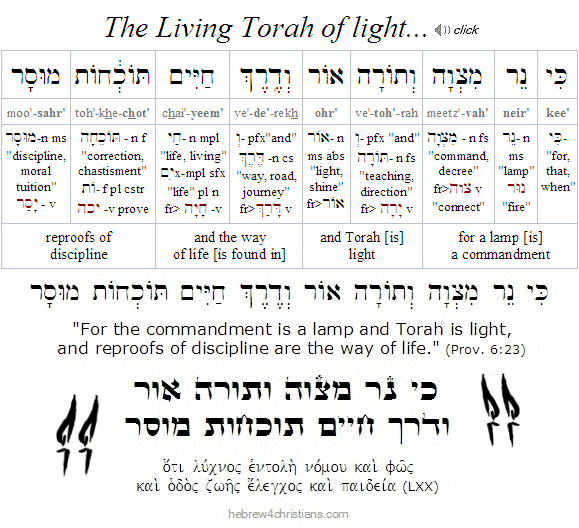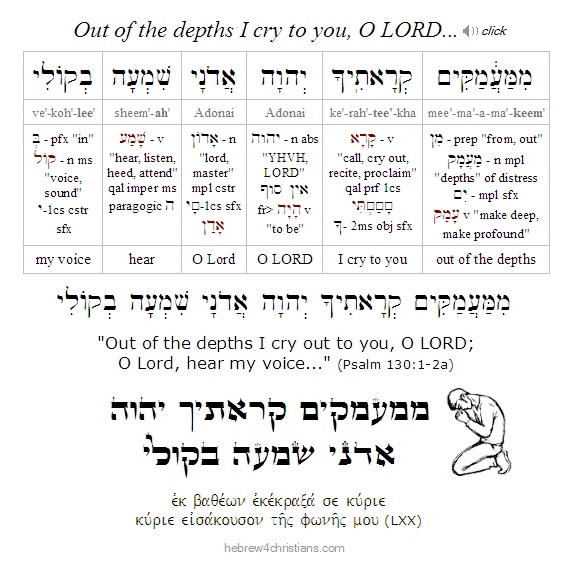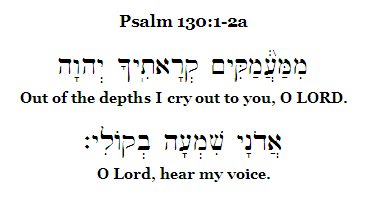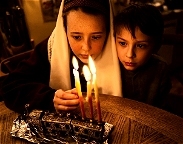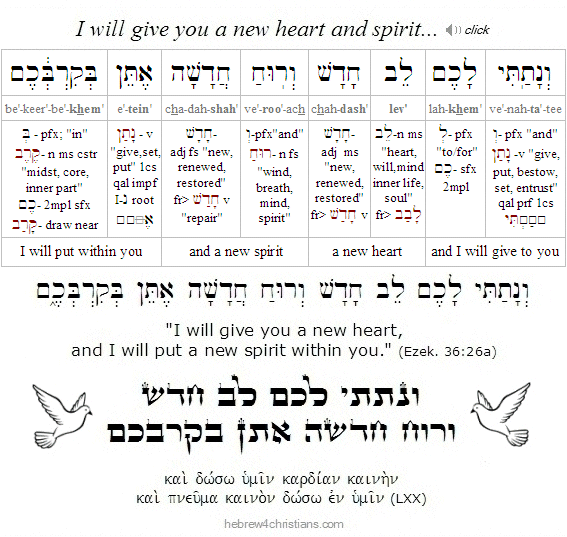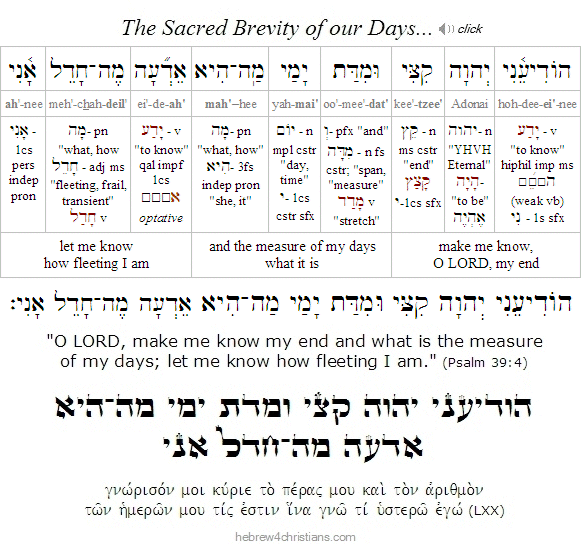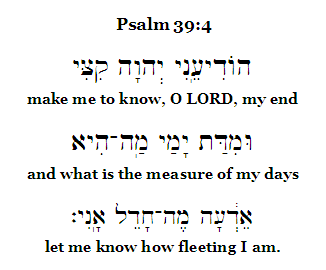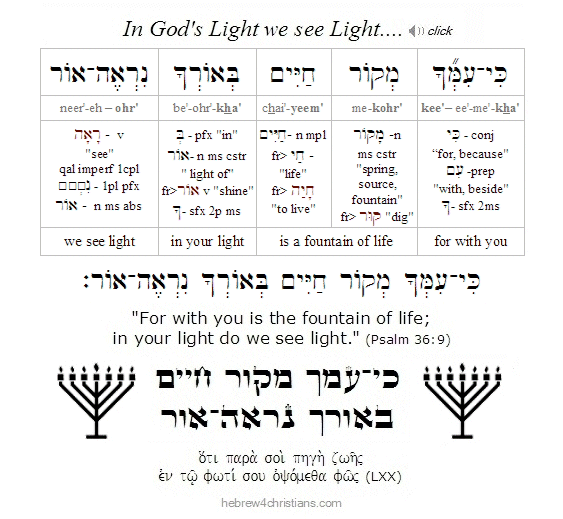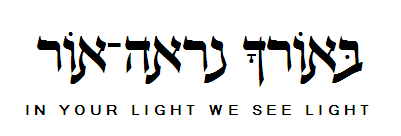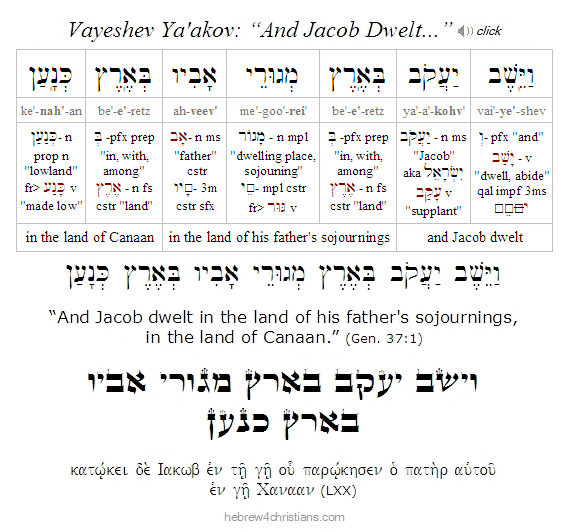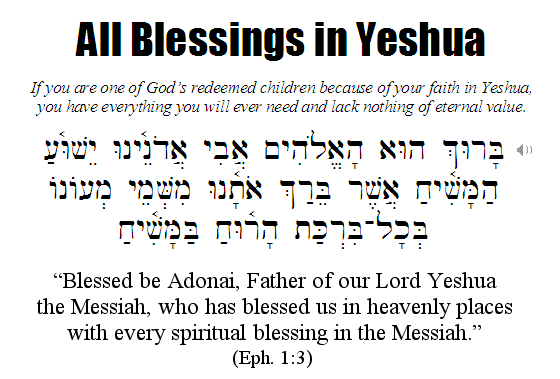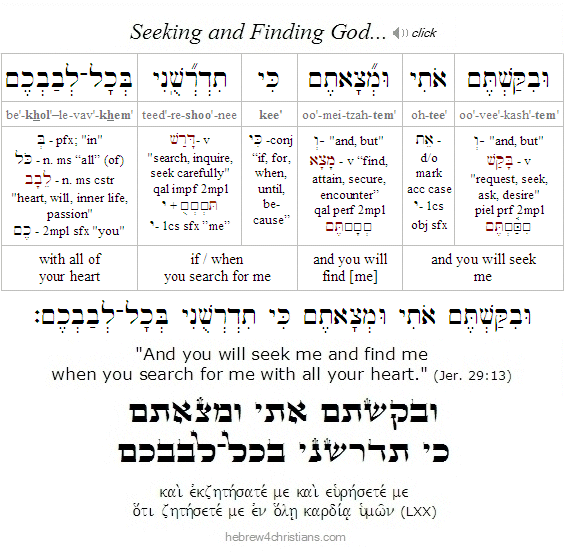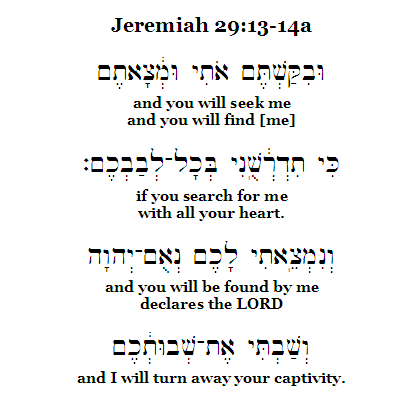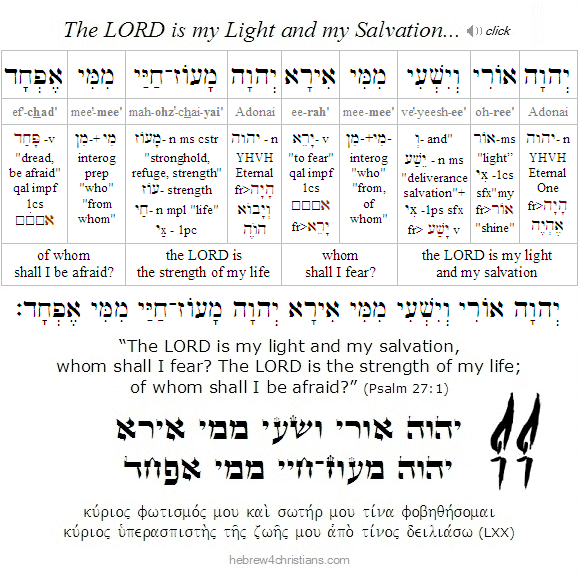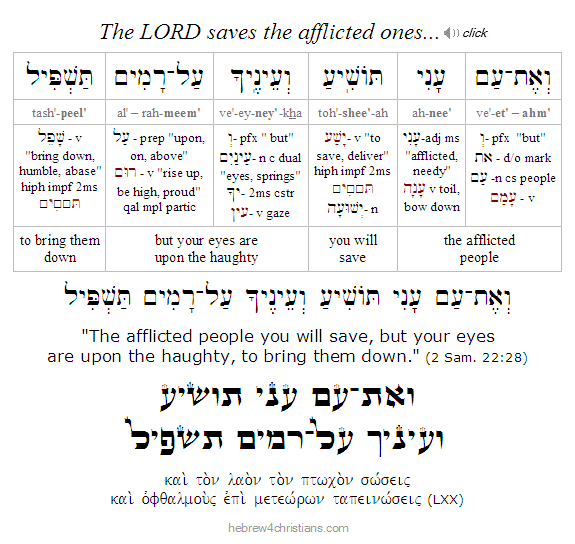|
December 2023 Updates (continued)
Note: Please refresh the page (or press F5) to see the latest updates...
Priests of His Light...
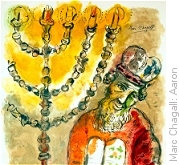
[ The eight-day Festival of Chanukah begins at sundown tonight! ]
12.07.23 (Kislev 24, 5784) The Chanukah holiday is upon us, friends, and may we all rededicate the "Temple" of our lives to serve the Lord and walk in His light wholeheartedly... Indeed, we are called to be a "kingdom of priests," a set-apart people, and a light to the nations (Exod. 19:6; Isa. 42:6; 1 Pet. 2:9). Note that the very first responsibility given to the priests of Israel was to care for the ner tamid (נר התמיד), the light of the Menorah (Exod. 27:20-21), to signify our consciousness of the Divine Presence (Psalm 18:28; 36:9).
The challenge we all face is to remain "in the light as God is in the light" and not to be seduced by the world's godless hermeneutics (Isa. 2:5; 1 John 1:7, 2:17). God's eternal light radiates through all things (Isa. 6:3; Psalm 139:11-12), just as the great "yehi ohr" (יְהִי אוֹר) - "let there be light" - is the first word spoken to creation (Gen. 1:3). To be a priest means being so filled with the truth of God that you radiate peace; your inner light shines and you glorify your Father in heaven (Matt. 5:16). That is how we draw others to the truth, by first receiving the beauty of the LORD (Psalm 27:4).
Of course being a "witness to the light," that is, being a "priest," does not mean you are a "perfect person" who walks about with a blissed-out attitude despite the various trials and tests we all face in this life. No, we all still sin, and we therefore need to confess the truth of our condition to abide in the light (1 John 1:9; James 5:16). Like everything else in Scripture, here we encounter paradox, as Yeshua taught: "Blessed are the impoverished in spirit (πτωχοὶ τῷ πνεύματι), for theirs is the kingdom of heaven; blessed are the ones who mourn (οἱ πενθοῦντες), for they shall be comforted; blessed are the meek (οἱ πραεῖς), for they shall inherit the earth" (Matt. 5:3-5). Yea, "God chose what is foolish in the world to shame the wise; God chose what is weak in the world to shame the strong, God chose what is low and despised in the world, even things that are not, to bring to nothing things that are, so that no human being might boast in the presence of God" (1 Cor. 1:27-29).
The Hebrew word for priest (i.e., kohen: כּהֵן) may come from the word ken (כֵּן) meaning "yes" and the word kivun (כִּווּן) meaning to "direct" or "lead," implying that a priest helps direct a person toward affirming the Reality and Truth of God. The role of a priest is to draw us to God, then, but how is that possible if the mediator cannot genuinely understand our sorrows and struggles? What draws others to God is his love, but how can we come to believe in that love were it not for the priesthood of the leper, the priesthood of the outcast, the priesthood of the reject? Even so Yeshua was afflicted with our infirmities and therefore sympathizes with our brokenness and frailty (see Heb. 4:16).
As a priest of brokenness, you are called to be a wounded healer, and you can testify of God's saving grace and love for you despite your sorrow, anger, weaknesses, and failures... Accepting God's compassion for you - just as you are - allows you to show grace and kindness to others who are also hurting, and therefore you can serve as a priest of God.
Be encouraged, friends... "For the commandment is a lamp and Torah is light, and the reproofs of discipline are the way of life" (Prov. 6:23). Here we may understand the "reproofs of discipline" as the (ongoing) process of consciously turning away from darkness (of fear, anger, etc.) to the behold the divine light. We have to start here, after all... The way of life is teshuvah (repentance, turning to God), which is a painful process to the lower nature, but is necessary to walk in the light. Confession brings light into our hearts (James 5:16; 1 John 1:5-9), and the end of our struggle is healing and life.
Happy Chanukah, friends, and let us walk in the Light of the LORD!
Hebrew Lesson:
Proverbs 6:23 Hebrew reading(click):
Personal Note: I will be leaving for my step-father's funeral today and will be gone for a couple days... shalom and love you you all. Happy Chanukah. - John
Israel's Rejected Prince...
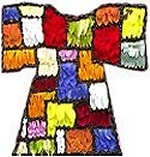
12.07.23 (Kislev 24, 5784) From the beginning of last week's Torah portion (Vayeshev) until the very end of Sefer Bereshit (the Book of Genesis), the focus shifts from the patriarch Jacob to his twelve sons, and particularly to his beloved son Joseph (יוֹסֵף). Recall that Joseph's jealous brothers had stripped him of his "coat of many colors" and then mercilessly threw him into a pit -- a providential event that eventually led to the deliverance of the Jewish people by the hand of a "disguised savior." Indeed, story of Joseph's ordeal is a story of divine hashgachah (providential supervision) that foretells the glory of Yeshua our Messiah, both as the Suffering Servant and as a national deliverer of Israel.
Parashat Vayeshev begins, "Jacob settled (vayeshev Ya'akov) in the land of his father's sojourning, in the land of Canaan" (Gen. 37:1), but then immediately turns to the story of Joseph, who was seventeen years old at the time: "And these were the generations of Jacob: Joseph being seventeen years old..." (Gen. 37:2). Why does the toldot (genealogy) of Jacob begin with Joseph rather than Reuben (the firstborn son of Leah) here? Was the Torah suggesting that Joseph was regarded by Jacob as his (chosen) "firstborn" son?
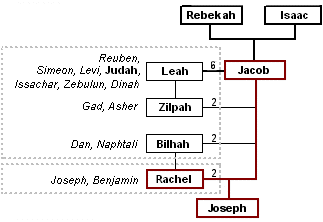 |
Jacob and Joseph undoubtedly shared a lot in common, and this surely caused Jacob to prefer his firstborn son (of Rachel) over his other sons. For instance, both men had infertile mothers who had difficulty in childbirth; both mothers bore two sons; and both were hated by their brothers. In addition, the Torah states that Jacob loved Joseph more than all his other sons since he was the son of his old age, and was the firstborn son (bechor) of his beloved wife Rachel. Indeed, Jacob made him an ornamented tunic (ketonet passim) to indicate his special status in the family.
At any rate, the Talmud (Sanhedrin 106a) notes that whenever the word vayeshev (וַיֵּשֶׁב) is mentioned in Torah, it introduces a painful episode. Immediately following the statement that "Jacob settled (vayeshev Ya'akov) in the land of his father's sojourning," the Torah states that Joseph brought an "evil report" about his brothers to his father. This act ultimately led to the selling of Joseph into slavery and to further heartache for Israel. The Jewish sage Rashi notes that whenever someone called by God wants to "settle down" and live at ease, God orchestrates events to keep him free from complacency. This certainly happened in the case of Jacob, where sibling rivalry and baseless hatred (called sinat chinam: שִׂנְאַת חִנָּם) so disrupted the peace of the family that his children were eventually led into exile and slavery.
But there is redemption and healing, even in the midst of betray and loss... We note that Joseph was sent by his father from the "depth of Hebron" (מֵעֵמֶק חֶבְרוֹן) to seek the welfare of his brothers (Gen. 37:14). Hebron (חֶבְרוֹן) is one of the very first places Abraham lived after he entered the Promised Land (Gen. 13:18). The word itself comes from a root (ח.ב.ר) that means "union," or "friendship," suggesting that from the depth of family union would come struggle but eventual deliverance. The "depths of Hebron" therefore suggests that Joseph's assignment was ultimately redemptive in nature - to restore love to the family by means of God's providential salvation...
Hebrew Lesson
Psalm 130:1-2 reading (click):
Waking Up to the Light...
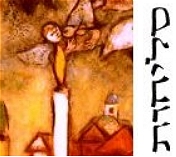
[ The eight-day Festival of Chanukah begins at sundown on Thursday, Dec. 7th this year... ]
12.06.23 (Kislev 23, 5784) Many people seem to sleepwalk through their days, without ever waking up... They miss life's wonder; they close their eyes to the Divine Presence; they shun asking the "big questions" because this disturbs their preconceptions; indeed, they would rather be entertained, mesmerized, and rendered unconscious. Many people prefer to be put under a hypnotic spell than to be brought back to reality; they actually want their illusions and virtual lives! The first step of deliverance is to confess that we are asleep, and that we prefer sleep to opening our eyes to the truth. As it is written, "it is light that makes everything visible; therefore it says, "Awake, O sleeper, and arise from the dead, and the Messiah will shine on you" (Eph. 5:14). Arise and shine, for your light has come!
Recall that the holy menorah (מְנוֹרָה) was formed from one piece of pure beaten gold weighing 3,000 shekels of silver (nearly 100 pounds). It was a highly decorative work that had seven branches (with seven lamps), nine flower blooms, eleven fruits, and twenty two cups. According to the Talmud, the menorah measured eighteen tefachim (i.e., "palms") in height (from the base to the start of the lamps), or roughly 5.25 feet. It is called the "lamp of God" (נֵר אֱלהִים) in the Scriptures (1 Sam. 3:3).
The "lamp of God" or holy menorah was to be fashioned by hammering a single piece of solid gold into shape (Exod. 25:36). Note that the word translated "hammered" or "beaten" (מִקְשָׁה) comes from the word for "difficult" in Hebrew (קָשֶׁה). According to midrash, the method for constructing the menorah was difficult for Moses to comprehend, so the LORD first showed him one in the fire and told him: "This is how you will make it." Moses was unable to do so, however, so the LORD told him to take a block of gold and have Betzalel (the carpenter from Judah) throw it into the fire. After a flash of dazzling light, a glorious menorah came out formed by God Himself.
The lamps of the menorah were lit daily, "from evening until morning," starting from the central lamp (the shamash) and then moving right to left (Exod. 27:21). According to the Talmud (Shabbat 22b), while all the lamps received the same amount of olive oil, the "westernmost" lamp (according to Rashi, the center lamp, due to its orientation) miraculously never ran out of oil, even though it was kindled first in the sequence. In other words, when Aaron would rekindle the lamps every evening, he found the shamash still burning, so he simply refilled it with oil and trimmed its wick. This miracle is also said to have occurred during the Temple period, though it abruptly ended about 40 years before the destruction of the Second Temple (c. 30 AD), after the death of Yeshua the Messiah, the true Servant and Branch of the LORD. As it is attested in the Talmud: "Our Rabbis taught: During the last forty years before the destruction of the Temple the lot ['For the Lord'] did not come up in the right hand; nor did the crimson-colored strap become white; nor did the westernmost light shine" (Yoma 39a).
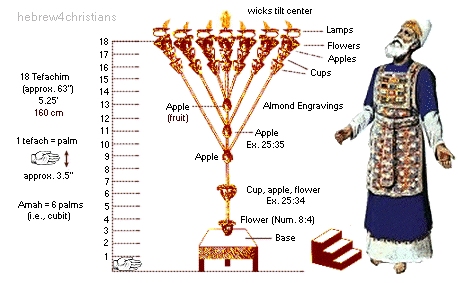 |
The light from the menorah is a spiritual light. It was not seen from the outside of the Tabernacle, but only while inside the holy chamber, before the holy place of sacrificial atonement. It enabled service to God to be performed, though it was not a light to be used for profane purposes. Notice that the six lamps faced the central lamp -- a picture of Yeshua, the Light of the World whose arms and legs were "hammered" for our sins.... He is the suffering servant (shamash) who lightens everyone in the world. He is the center, the supporting trunk for the other branches (John 15:5).
The light itself came from the burning of pure olive oil - a symbol of anointing and the Holy Spirit (רוּחַ הַקּדֶשׁ). It was kindled by the hand of a man of peace and humility. Likewise, when we are given light to behold the sacrifice of Yeshua for our atonement (כַּפָּרָה), we are filled with the divine light (John 8:12; 1 John 1:7, Eph. 5:8). When we come to the cross, we can behold the truth of God's unfailing love that draws us to be united with Him.
Hebrew Lesson
Psalm 119:105 reading (click):
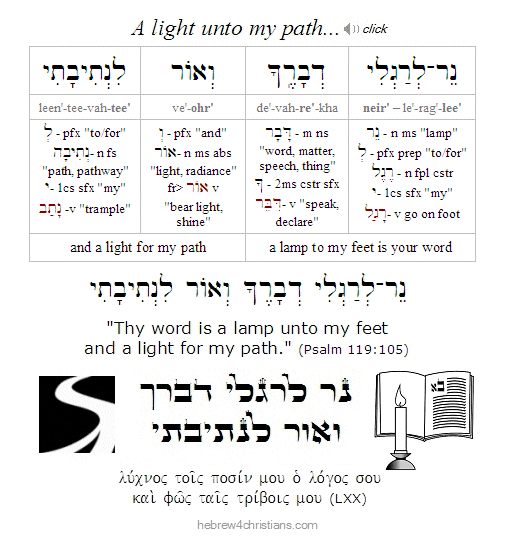 |
It is not easy to wake up, to rouse ourselves, to find focus, concentration, "kavanah," - and yet spiritually speaking it is essential. Hence Yeshua repeatedly asked his disciples: "Do you now believe?" May God have mercy upon us and help us arise to behold His glorious light!
Remembering our End...

12.05.23 (Kislev 22, 5784) Today I learned that a friend from my childhood recently died. When we consider our brief lives in this world, it is important to cherish the gift of others whose lives intersect with our own... We are on a journey that leads to what is eternally true and abiding: "The grass withers, the flower fades, but the word of our God will stand forever" (Isa. 40:8). God is the only enduring Reality in a constantly changing world, and He has designed it this way to cause our hearts to search for him. "All flesh is grass, and all its beauty is like the flower of the field" - such is the condition of this ephemeral world with its flux and fortunes. The flesh fades because the breath of the LORD blows upon it (Isa. 40:7). God Himself has ordained human life to be a vapor....
This world is not our home; we are "strangers" here. It is an affliction to wait for the LORD, a sort of "homesickness" of heart... The apostle Paul says our loneliness and alienation prepare for us an "eternal weight of glory" beyond all comparison, because we are not looking at what can be seen but at what cannot be seen. "For what can be seen is temporary, but what cannot be seen is eternal" (2 Cor. 4:17-18). Just as the "two-souled" man is unstable in all his ways, so the process of being "educated for eternity" means learning to focus our heart's passion and hope on the glory of heaven. "For where your treasure is, there will your heart be also."
God is our "Rock," a metaphor that implies that He is the immovable foundation and cornerstone of all reality. God is our strong refuge in the stormy changes we all face in this world. His Presence both grounds us and sustains our way. Nonetheless we walk by faith, not by sight, and often the sojourner in this world faces testing and even tribulation. In his despair, Job once asked, "If a man dies, shall he live again? All the days of my warfare I will wait until my change comes" (Job 14:14).
We must give our secret pain to God, even if we don't understand it, and even if it refuses to go away... Our hearts are often vexed; we are a mess of mixed motives; we are strong to be made weak, weak to be made strong. We bless and curse from the same mouth... And yet, despite all this, despite our inner contradictions, the dance between the "old man" and "new," the divided house of our lives - our present sorrows, our troubles, our fears – we must endure ourselves, we must press on, and we must never let go of hope in God's love. Therefore we must not hide ourselves from God's presence, nor pretend to be what we are not. We are invited to come boldly before the Lord to help in our hour of need (Heb. 4:16). O Lord my God, be Thou my healer, the One who makes me whole... Refa'eini Adonai, ve'eiafei: "Heal me, O LORD, and I shall be healed." Amen.
Please keep fighting the "good fight" of faith (1 Tim. 6:12). You infinitely matter to heaven; your life has great value; you are significant and you are truly loved by our Heavenly Father... There is a "future and a hope" reserved for you (Jer. 29:11); there is "a white stone, and on that stone will be written a new name that no one can understand except the one who receives it" (Rev. 2:17). This promise is given to the "one who conquers" because of the love and grace of our God. Indeed, by faith we are made "more than conquerors" (lit. "hyper conquerors") through Yeshua our LORD (Rom. 8:37).
Happy Chanukah and my love and appreciation for you.... May God's overcoming light shine within your heart of faith! Amen.
Hebrew Lesson
Psalm 103:17a reading (click):
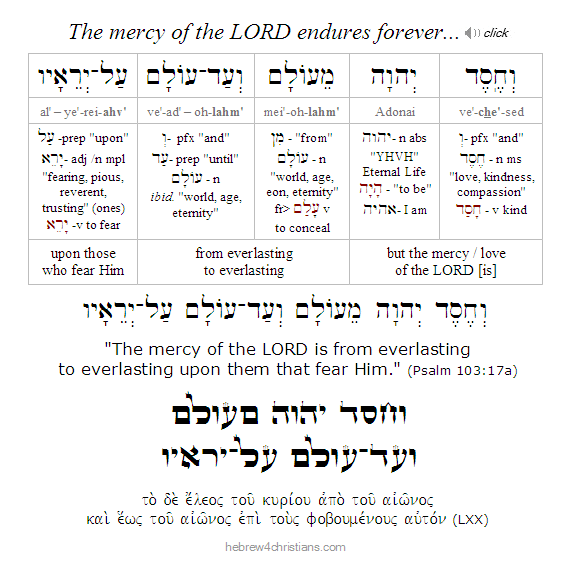 |
The Overcoming Power...

12.05.23 (Kislev 22, 5784) It is written in our Scriptures "whoever is born of God overcomes the world; and the victory that overcomes the world is our faith" (1 John 5:4). Note that this victory is not attained by Stoic resignation from the "world of shadows," nor by the meticulous observance of the religionist, but this victory comes by means of divine power that "regenerates" the soul to experience communion with God. Only the person who has been reborn by God's Spirit can overcome the "world" which, in this context, refers to the realm of humanity in its lost condition, called "olam ha'sheker" (עולם השקר), and wherein every individual soul is hopelessly bound at birth because of the inherited condition of "spiritual death" (John 8:24; Rom. 5:12). This is the world Yeshua spoke of when he told those who opposed him: "You are from below (ἐκ τῶν κάτω), I am from above (ἐκ τῶν ἄνω); you are of this world (ἐκ τούτου τοῦ κόσμου), I am not of this world (ἐκ τοῦ κόσμου τούτου). In Yeshua's thinking, there is a clear separation between the spiritual world above, marked by eternal life and divine blessing, and the fallen world below, marked by death and divine separation. Unless the soul is miraculously regenerated by the power of God and "translated" into the divine kingdom, it is bound to its mundane condition and abides in perilous need of deliverance (John 1:12-13; John 3:5). Yeshua is the one who overcame the world, and by means of his sacrificial atonement upon the altar of the cross and his invincible resurrection life, He alone imparts power those who trust in him to overcome the world as well (1 John 3:8; 4:4). "Who is the one who overcomes the world but the one who believes that Jesus is the Son of God?" (1 John 5:5).
Yeshua told his followers: "These things I have spoken to you so that in Me you may have peace. In the world you will have tribulation; but be of good cheer, I have overcome the world" (John 16:33). Note here the Lord did not want to take us out of the world but that we should learn to overcome its tribulations by the exercise of our faith (John 17:15). The victory of our faith, then, is expressed as we learn to encounter the world as a "ladder" to lift us to God. That is what the "use" of the world is for the believer: an instrumental means to overcome its lies and to testify of God's power of deliverance. The world system (and its ruler, Satan) seeks to blind our hearts and conquer our souls; but when we engage it incidentally, as medium or an occasion of encounter with heaven, we conquer the world. The true victory over the world is won by a new life, born of and kindred with God; and brought to life in our souls through faith in Yeshua as our risen Lord and Savior: "As many as received Him, to them He gave the power (i.e., ἐξουσία) to be children of God, to those who believe in His name, who were born, not of blood, nor of the will of the flesh, nor of the will of man, but of God" (John 1:12-13). This new life from above is marked by new desires and strength to overcome the seductions of the world. We will be given grace to do all things in the might of Yeshua who gives us inner strength, for He has become the life of our life, the soul of our soul. God's own Spirit will be the strength of our spirit.
So are you walking in faith of Yeshua that overcomes the world? Have you experienced the new nature? Are you born from above? Have "old things passed away and all things become new?" Trust in Him and in the great love that gave itself for you to find life. Spend time with him by daily reaching out, both in the sighs of your heart and in the times of your joys. Know everything in light of his truth and presence. "Do not be conformed to this world, but be transformed by the renewing of your mind" (Rom. 12:2). Consciously set the LORD always before you and you will not be shaken by common tribulation (Psalm 16:8). Practice his presence and, in the midst of it all, take hold of His hand, share His victory, and experience the blessing of his shalom. And thanks be to God who gives us the victory through our Lord Yeshua the Messiah! Amen.
Hebrew Lesson
Ezekiel 36:26a reading (click for audio):
The Present Hour...
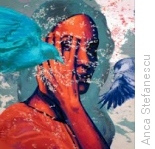
12.04.23 (Kislev 21, 5784) Rabbi Elazar in the Mishnah says, shuv yom echad lifnei mi'tatakh (שׁוּב יוֹם אֶחָד לִפְנֵי מִיתָתְךָ): "Repent one day before you die" (Avot 2:10). Yes, but who knows the day of one's death in advance? Perhaps your name will be called today, ending your "lease on life" in this world. Are you ready? Are you prepared to appear before God your Creator and Redeemer to give account for your life?
In light of our existential uncertainty, the sages counsel us to live each day as if it were our last, making sure we are attending to the things that really matter... But "watch -- for you know neither the day nor the hour..." (Mark 13:33). As C.S. Lewis wrote: "The Future is, of all things, the thing least like eternity. It is the most temporal part of time -- for the Past is frozen and no longer flows, and the Present is all lit up with eternal rays, the point at which time touches eternity. Of the present moment, and of it only, humans have an experience analogous to the experience which [God] has of reality as a whole; in it alone freedom and actuality are offered them. God would therefore have us continually concerned either with eternity (which means being concerned with Him) or with the Present — either meditating on their eternal union with, or separation from, Himself" (The Screwtape Letters).
Hebrew Lesson
Psalm 39:4 Hebrew reading (click):
It takes awareness of the brevity of our days to realize that life is a great gift. Sometimes we are awakened at the death of a loved one; other times we have our own "near death" experiences... The scarcer a resource becomes, the more it is valued. So too with time. If we had thousands of years to live, it is likely that we would disregard or postpone the most essential questions regarding the meaning of our lives. Therefore we pray to be aware of how fleeting our days are -- so that we will attend to matters of eternal significance!
Do you now believe?

12.04.23 (Kislev 21, 5784) "Do you now believe?" (John 16:31). Some people are scandalized by what they call "easy believism," or the idea that we only need to believe in Yeshua to be saved. Sometimes they malign this teaching as "cheap grace" or "sloppy agape," though in fairness it must be stressed there is nothing easy about truly believing. What is easy, however, is professing that you believe without undergoing a miraculous heart transformation. Anyone can say, "I believe in Jesus," but the test is whether he lives within you. Is he the source of your life? Do you draw life from Him? Anyone can claim they are saved, but it is a miracle greater than splitting the sea to undergo divine metamorphosis, to be given a heart that loves unconditionally, that dies to pride, and that lives as the servant of all. Yeshua asks, "Do you really believe? Many will say to me in that day, 'Lord, Lord...' but I will say to them, 'I never knew you...' (Matt. 7:22-23). It's not just hard to believe (obey), it's impossible apart from God's radical intervention. It is the Spirit that gives life; the flesh is no help at all (John 6:33).
Living by faith does not mean we profess Christianity or "talk theology" like some college professor. It's one thing to believe that, and another to believe in... Human reason can rightly infer that a morally good, all-powerful Creator exists, for example (Rom. 1:20), but it is unable to know God's love that way... Love requires trust, "taking to the heart." We are to "know this day and turn to your heart (והֲשֵׁבתָ אֶל־לְבָבֶךָ) that the LORD is God in heaven above and on the earth beneath; there is no other" (Deut. 4:39). We need to know truth (cognitive) and to be moved by the heart (emotional); we need both Spirit and Truth (John 4:24). "For all things come from You (כִּי־מִמְּךָ הַכּל), and from your hand we give to you" (1 Chron. 29:14). Teshuvah centers on Yeshua our Savior: turn to believe in Him!
Regarding the question of faith, Kierkegaard once wrote, "The easiness of Christianity is distinguished by one thing only: by the difficulty. Thus the Master's yoke it easy and its burden light -- for the person who has cast off all his burdens, all of them, the burdens of hope and of fear and of despondency and of despair -- yet it is difficult." The issue here has to do with certainty of faith, the "infinite certainty" that is faith's passion, versus the "probabilistic" apprehension of truth that comes from historical investigation... Yes, the difficult thing is to truly believe in the "for-you miracle" of God's love. Sins can be like great possessions that are difficult to give up. Among other things, we must forgive ("give away") our sins (both our own and those against us), and that means trusting God enough to bear our wounds for us. Forgiveness allows us to move on with our lives by letting go of the pain of the past (2 Cor. 5:16). The atonement cost God everything, and yet is of no spiritual value until it is accepted into the heart. It is "easy" to understand this, but it is difficult to live it. πιστεύω· βοήθει μου τῇ ἀπιστίᾳ - "I believe, help thou my unbelief" (Mark 9:24).
Hebrew Lesson
Genesis 15:6 reading (click for audio):
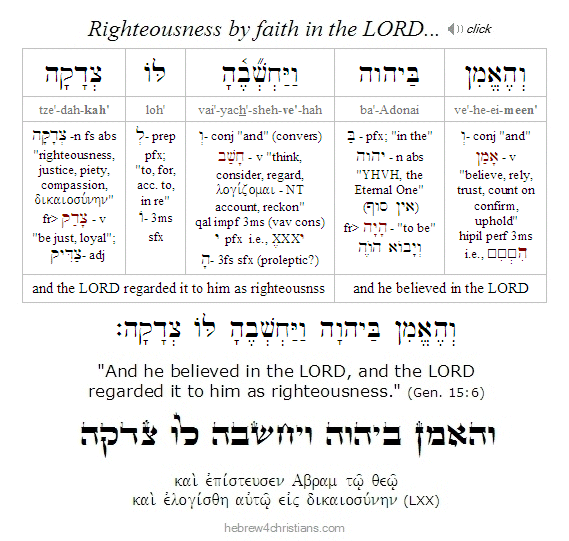 |
Celebrating Chanukah...
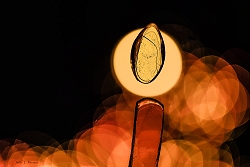
[ The eight-day Festival of Chanukah begins at sundown on Thursday, Dec. 7th this year... ]
12.03.23 (Kislev 20, 5784) Celebrating Chanukah is an easy and enjoyable experience that does not require a lot of cost or effort. All you will need is a Chanukah menorah, a box of 44 Chanukah candles, and a blessings sheet (available free from Hebrew for Christians). Optionally you can get a dreidle to spin for amusement and some Chanukah decorations. Traditionally we eat some simple foods that are cooked in oil, such as potato latkes, kugel, jelly donuts, etc. Overall the mood of the holiday is festive and joyful - a time to remember how God performs miracles for his people as he did for Israel when the holy Temple was recaptured and restored from Greek-Syrian oppressors during the second century B.C.
For each of the days of Chanukah we light candles, kindling one for the first day, two for the second, and so on until we reach the climactic eighth day, when all shine together. Some of the sages say the word "Messiah" (i.e., mashiach: מָשִׁיחַ) may be regarded as an acronym for the phrase "we light throughout the eight days of Chanukah," i.e., מַדְלִיקִין שְׁמוֹנָה יְמֵי חֲנוּכָּה: madlikin (מ) shemonah (שׁ) yemei (י) Chanukah (ח). Indeed, the central lamp of the Chanukah menorah is called the shamash (שַׁמָש), the "Servant" that bears the original flame that kindles all the others. The salvations, wonders, and solace that God performed for us "in those days, at this time" therefore prefigure the greater deliverance we have in Yeshua, the Suffering Servant and Light of the World...
Hebrew Lesson:
Psalm 36:9 Hebrew reading:
Parashat Vayeshev - וישב
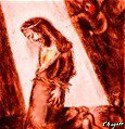
[ In our Torah for this week we read how Joseph's jealous brothers stripped him of his "coat of many colors" and threw him into a pit -- a providential event that eventually led to the deliverance of the Jewish people by the hand of a "disguised savior." Indeed, the life of Joseph foreshadowed the two advents of Yeshua our Messiah: first as Israel's Suffering Servant and second as the national deliverer of the Jewish people during the time of great tribulation... ]
12.03.23 (Kislev 20, 5784) Last week's Torah (i.e., parashat Vayishlach) recounted how Jacob had wrestled with a mysterious Angel before returning to the Promised Land to be reconciled with his brother Esau. This week's portion (i.e., parashat Vayeshev) begins with Jacob living back in the land promised to Abraham and Isaac with his 12 sons, but the narrative quickly turns to Jacob's favorite son Joseph, who was seventeen years old at the time. The Torah states that Jacob loved Joseph more than all his other sons since he was "the son of his old age," and he was the firstborn son of his beloved wife Rachel. Indeed, Jacob made him an ornamented tunic to indicate his special status in the family.
As the favored son, Joseph's job was to oversee the activities of Jacob's concubines sons (Dan, Naphtali, Gad, and Asher) and to bring "reports" about their activities back to Jacob. However, this role as the overseer and "favored son" was too much for the other brothers, and they became jealous of him and hated him. To make matters worse, Joseph related two dreams to his brothers that foretold that he was destined to rule over them, increasing their envy and hatred of him (the implication of the dreams was that all of Jacob's family would become subservient to him). Jacob rebuked Joseph for arousing his brothers' hatred, but he inwardly took note and waited for the fulfillment of the dreams.
The portion records that one day the brothers went out to pasture their herds, but when they saw Joseph coming to check on them, they conspired to kill him, though later they decided to sell him to some slave traders instead. The brothers then staged Joseph's death by dipping his special tunic into goat's blood and bringing it to their father, who was deceived into thinking that Joseph had been killed by a wild animal.
Meanwhile Joseph was purchased at a slave trade by Potiphar, a captain of Pharaoh's guard. The LORD was "with Joseph," however, and blessed everything he did. In fact, soon he was promoted to be the head of Potiphar's entire household affairs. Potiphar's wife then began enticing Joseph to have an affair with her, and though he steadfastly refused her advances, she later falsely accused him of attempted rape. Potiphar was understandably outraged (at his wife?) and threw Joseph into the royal prison, but again God showed him favor there and soon was appointed to a position of authority in the prison administration.
The portion ends with two prophetic episodes in Joseph's life that eventually would bring him to the attention of Pharaoh himself. While in prison, Joseph met Pharaoh's wine steward and chief baker, both incarcerated for offending their king (according to Rashi, a fly was found in the goblet prepared by the butler, and a pebble in the baker's confection). Both men had disturbing dreams which Joseph correctly interpreted; in three days, he told them, the wine steward would be released but the baker would be hanged. Joseph then asked the wine steward to advocate for his release with Pharaoh. Joseph's predictions were fulfilled, but the wine steward forgot all about Joseph.
Hebrew Lesson:
Genesis 37:1 Hebrew reading:
Holiday Alert: Chanukah...

This year the eight days of Chanukah begin on Thursday, December 7th after sundown (1st candle) and will run until Thursday, December 14th until sundown. The tradition is that on the first night of Chanukah one flame is lit, on the second night two, and so on until the eighth night when eight flames are lit. In this way we remember the 'growth' of the miracle.
Personal Note:
My step-father Otto died of a massive heart attack last night. We are planning to go to Chicago for his funeral service later this week. He was 95 years old. Otto was a warmhearted man who fled from Nazi Germany as a child as eventually moved to the United States. He met my mother years later, they courted for a few years, and were married for the last couple decades. He accepted Yeshua as his Savior about 15 years ago. In his final years he suffered from Alzheimer's disease. He was a lovely person and will be missed...
The Torah of Wresting...
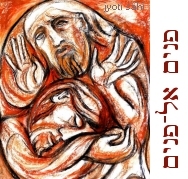
[ The following is related to our Torah reading for this week, parashat Vayishlach... ]
12.01.23 (Kislev 18, 5784) Yeshua warned those who professed faith: "Not everyone who says to me, 'Lord, Lord,' will enter the kingdom of heaven, but the one who does the will of my Father who is in heaven. On that day many will say to me, 'Lord, Lord, did we not prophesy in your name, and cast out demons in your name, and do many mighty works in your name?' And then will I declare to them, 'I never knew you; depart from me, you workers of lawlessness'" (Matt. 7:21-23). "I never knew you..." Despite the practice and profession of their faith, these people were actually strangers to God... They had a false sense of assurance, believing that they were "serving God" when in truth they were not... So the all-important question here is whether Yeshua truly knows you. You may know a lot about God, religion, spirituality, and yet you may remain unknown by him... So where do you find life? What are you loving? Where are you going?
"Not everyone who says to me, 'Lord, Lord,' will enter the kingdom of heaven, but the one who does the will of my Father who is in heaven" (Matt. 7:21). Yet what is the will of the Father but to trust in Messiah for life (John 6:40)? Yeshua was asked:"What must we do, to be doing the works of God?" and he answered: "This is the work of God (Τοῦτό ἐστιν τὸ ἔργον τοῦ θεου), that you believe in the One whom he has sent" (John 6:28-29). The Torah of salvation centers on trusting the Messiah (Titus 3:5-7).
On that day many will say to me, 'Lord, Lord, did we not ... do many mighty works in your name?' And then will I say to them, 'I never knew you; depart from me, you workers of lawlessness' (Matt. 7:22-23). From this we see that good works - even those done in the name of Messiah - are insufficient for life, and that something more is needed... That "something more" is the reality of authentic relationship with him. However, even Yeshua's sacrifice on the cross can't bring you into relationship with him apart from receiving it for your healing... By faith you encounter Yeshua clothed in your flesh, your sin, and suffering death for you. "As long as Christ remains outside of us we are separated from him."
Some people feel frightened when they consider all this, but the fear arises only if we miss Yeshua's point... Good works can't save you, even those performed in the Savior's name... What saves you is trusting in God's great love for your life. Again, "this is the work of God, to trust in the One whom God has sent [for you]" (John 6:28-29). Genuine salvation is "from the LORD" (יְשׁוּעָתָה לַיהוָה) that is, comes as a result of his loving intervention on your behalf (Titus 3:5-7; Eph. 2:8-10). It is his righteousness that saves, not our own... This is the will of the Father, the Torah of the LORD (תורת יהוה), namely, to honor the Messiah and know him by faith... You trust him for eternal life, you believe that he bears your sins, you seek to know his heart, and you desire to share your life with him. It is lawlessness to reject the Torah of the LORD that commands us to follow Messiah and know him in all our ways - including the ways of our struggles, our fears, and so on...
Each of us must wrestle alone, in the dark places of fear, to find our new name from God (Gen. 32:24). Is the blessing for you or not? The essential thing is to know (and more importantly) to be known by Yeshua.... It is a matter of trust, of sharing your heart, being real with him, walking with him, loving him... "This is the work of God, to trust in the One whom God has sent [for you]." Trusting in the Lord means accepting that you are truly loved (and made safe) because of who God is...
The gospel is "the power of God for salvation to everyone who believes, to the Jew first and also to the Greek" (Rom. 1:16). It is a miracle of being in a right relationship with God. We are pursued by his love, and he haunts us until we surrender to his will (John 6:44)... Like Jonah we first must be "swallowed up" in consciousness of our own rebellion before we realize we are undone, that we are without remedy apart from God's intervention and deliverance. We start there - in the "belly of the fish" - and later are resurrected to go forth by God's mercy and grace. As we look to Yeshua, as we lean on him, he reveals more of himself to us. He gives us the grace and strength we need; he is always enough...
Whether Yeshua is living in you (and you are living in Him) is the most important question of your life upon which everything else turns. The great mystery is "Christ in you, the hope of glory" (Col. 1:27). As Ravenhill once said, "I don't ask people if they're saved anymore; I look them straight in the eye and say, "Does Christ live inside you?" Indeed, He is present right now -- for you -- in this very moment... Are you connected with Him in the truth? Are you drawing life from His life? Do you really live in Yeshua? "God is making his appeal through us. We implore you on behalf of Messiah, be reconciled to God" (2 Cor. 5:20).
Again, each of us must wrestle alone to receive our new name from God, and again I ask: Is the blessing for you or not? Are you willing to be loved and accepted by him? Are you willing to surrender your soul to him? What is your name? What do you call yourself? You cannot know God apart from his love, yet for some people that is exactly where the struggle lies... Look within your heart; test yourself; do you believe God cares for you? Take hold of the promise and do not let go until you know who you are in his love. "To the one who conquers I will give some of the hidden manna, and I will give him a white stone, with a new name written on the stone that no one knows except the one who receives it" (Rev. 2:17).
Affirmations of Faith:
The blessing is there for you, though you might need to wrestle in faith to fully take hold of your identity in Christ. May God help you answer to the new name he calls out to you...
Audio Podcast:
Seeking God's Face...

12.01.23 (Kislev 18, 5784) From our Torah portion this week (i.e., Vayishlach) we read: "And Jacob called the name of the place "the Face of God" (i.e., Peniel: פְּנִיאֵל) saying, "For I have seen God face to face (פּנִים אֶל־פָּנִים), and yet my life has been delivered" (Gen. 32:30). And where did Jacob see God "face to face" except in the struggle of faith, while seeking the blessing, even in the midst of his own inner conflict? And here too may we find the Shining Presence, the Face of God, even in the midst of our troubled lives, as we struggle, refusing to let go until we are taken hold by God's love...
"And Jacob called the name of the place 'Peniel,' translated "the Face of God." The "name of the place" (שֵׁם הַמָּקוֹם) here refers to the heart, the inner sanctuary, which is called the place of God. Where it says, "let them make me a Sanctuary, that I may dwell in their midst" (Exod. 25:8), the text literally reads, let them make me a sanctuary, that I may dwell within them (בְּתוֹכָם), that is, within their hearts. The place (המקום) is therefore the holy ground of the heart; the place within where God's face is disclosed, and where we apprehend God.
It is noteworthy that the Hebrew word for "face," i.e, panim (פָּנִים), is written the same way as the word for "inside," that is, penim (פְּנִים). Indeed the word face comes from a root word panah (פָּנָה) meaning "to turn" (the Hebrew preposition "before," i.e., lifnei (לִפְנֵי) comes from the same root and literally means turning toward or facing something). We can come to "the place of God" when we turn our hearts in respect before what is real and true. Indeed, "respect precedes Torah," which means we cannot even begin to experience the Divine Presence apart from honoring the sacred, distinguishing it from the common, and understanding that we owe every fiber of our existence to the One before whom we shall give account (Heb. 4:13). The Holy Spirit solemnly promises: "You will seek me and find me, when you seek me with all your heart; and you will be found by Me, declares the LORD, and I will turn away your captivity" (Jer. 29:13-14).
Hebrew Lesson:
Jeremiah 29:13 Hebrew reading:
"With all your heart" -- with both your "good" heart and with your "evil" heart -- that is, with all that is within you do you seek... You don't wait until you are "cleaned up" to reach out to God, but come "just as you are" -- in the midst of the messiness and sin of your life...
Prayers in the dark...
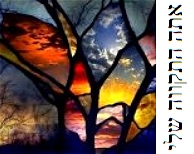
12.01.23 (Kislev 18, 5784) "I believe that you have full power and authority over the world and its evil, Lord, but I am unsure how that operates in light of its seeming absence.... You stop the mouth of lions, yet the lion's den is present; you heal the sick, yet we bury our dead; you say we are saved, yet much within us remains broken... My faith tries to see beyond the pale of this temporal world and its shadows, yet I am still bound by it, still subject to its vanity, still in a place of exile. When I look for you here, in this moment, I find my heart homesick and yearning; I seek your face... I call you Father but I feel orphaned in this world... It is not why I suffer that I want to know, Lord, but whether I suffer for you."
"Though the fig tree should not blossom, nor fruit be on the vines, the produce of the olive fail and the fields yield no food, the flock be cut off from the fold and there be no herd in the stalls, yet I will rejoice in the LORD; I will take joy in the God of my salvation (אֱלהֵי יִשְׁעִי), literally, "God my Jesus" (Hab. 3:17-18). Come alive, O heart of faith!
Hebrew Lesson
Psalm 27:1 reading (click for audio):
Raised from the Dust...
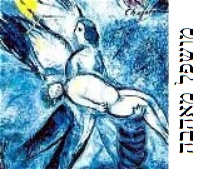
[ The following is related to our Torah reading for this week, parashat Vayishlach... ]
12.01.23 (Kislev 18, 5784) In his appeal to God for help before confronting his estranged brother Esau, Jacob prayed: "I have been diminished (קָטנְתִּי) by all the kindness and all the truth you have done for your servant" (Gen. 32:11). Jacob was "made small" through the revelation of God's love and truth, and the focus shifted away from himself to God: "He must increase, but I must decrease" (John 3:30).
Jacob's subsequent wrestling with the angel pictured birth pangs, the throes of his spiritual rebirth. Rashi notes that the word translated "wrestled" (i.e., va'ye'avak: וַיֵּאָבֵק, Gen. 32:24) is related to the idea of "raising the dust" (i.e., avak: אָבָק), which suggests resurrection from the dust. The struggle – the deathmatch – was to bury old Jacob and to raise him up as "Israel," a prince of God the King.
קָטנְתִּי מִכּל הַחֲסָדִים וּמִכָּל־הָאֱמֶת
אֲשֶׁר עָשִׂיתָ אֶת־עַבְדֶּךָ
kah·tohn'·tee · mee·kohl · ha·cha·sah·deem · oo·mee·kohl · hah·e·met
a·sher · a·see'·ta · et - av·de'·kha

"I am not worthy of the least of all the deeds of love and faithfulness
that you have done for your servant."
(Gen. 32:10)
Yeshua told us we must "forget ourselves" in order to discover what really matters: "If anyone would come after me, let him deny himself and take up his cross and follow me. For whoever would save his life will lose it, but whoever loses his life for my sake will find it" (Matt. 16:24-25). Note that the phrase translated "deny himself" comes from a Greek verb (ἀπαρνέομαι) that means "to affirm that you have no acquaintance or connection with someone," and is the same verb used when Peter denied the Messiah (from α-, "not," + ῥέω, "to speak"). To deny yourself, then, means to be willing to disregard your own personal interests in a given moment -- to "betray" the selfish impulse that seeks to rule the ego in your daily life. It is a "putting off" of the old nature and a "putting on" of the new (Eph. 4:22-24). Put positively, denying yourself means "forgetting yourself" because you are overwhelmed with God's great love for your soul, and therefore you no longer "know yourself" according to the flesh but according to the Spirit of God (2 Cor. 5:16-17).
Hebrew Lesson
2 Samuel 22:28 reading (click):
<< Return
|
|








